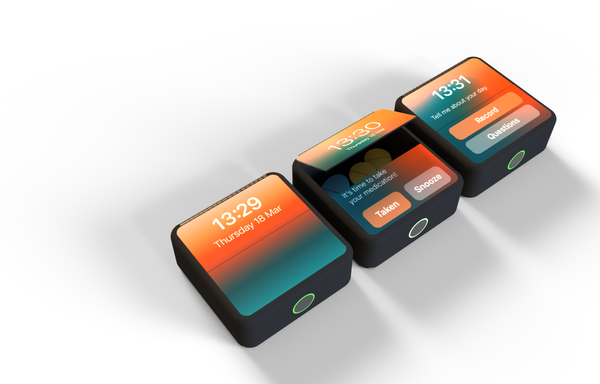
Pilly
‘Pilly’ is a smart pill box designed for people newly diagnosed with HIV. The pill box uses Artificial Intelligence (AI) to enhance users’ routines around medication and treatment.
Hear from HIV community representatives who have been involved in the INTUIT research.
Reflections by Ant Babajee (he/him), Advisory Board member.
Reflections by Becky Walker (she/her), Engagement Officer (Blue Sky Trust).
Our researchers at Newcastle University and Terrence Higgins Trust collaborated with Masters students in Communication Design at Northumbria University on a 4-week Social Innovation Design Brief entitled ‘Living Well with HIV through Trusted Online Communications in a Post-pandemic Society’. Students responded through design to address challenges associated with the sharing of experiences and personal information for supporting self-management of health and wellbeing. Blue Sky Trust supported a ‘Show and Tell’ session where stakeholder and end-user feedback was provided on design ideas.

‘Pilly’ is a smart pill box designed for people newly diagnosed with HIV. The pill box uses Artificial Intelligence (AI) to enhance users’ routines around medication and treatment.
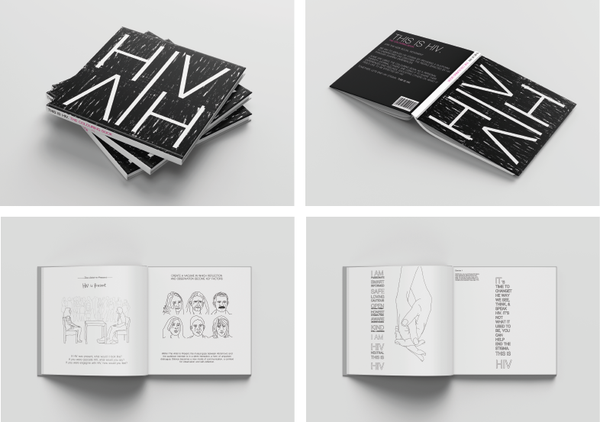
‘This is HIV’ is a campaign starting in the form of a colouring book which encourages readers to creatively share their experience of living with HIV. Creative outputs form the basis of the campaign and can be shared in different ways, via social media and public exhibitions.
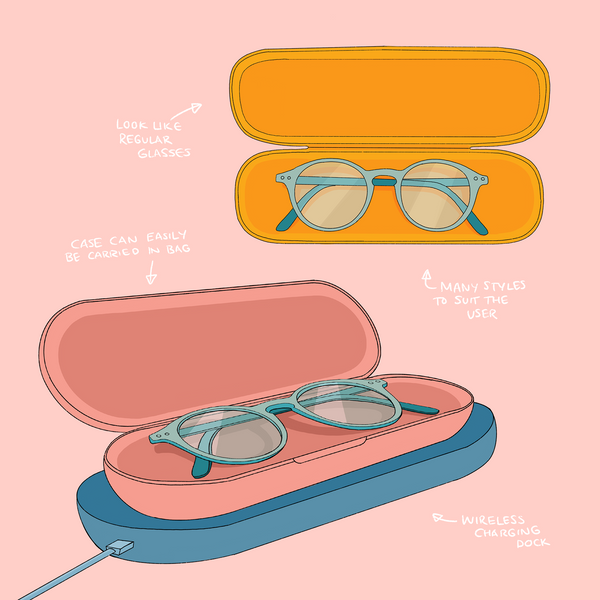
‘Contact’ is a peer support network that allows users to self-manage their health whilst feeling part of a community. Users can set up reminders and take mindful sessions to help with anxiety.

‘T^LK’ is a website that offers art therapy classes that can be attended virtually or in person. The community aims to create a safe space for members to connect through Arts.

‘Reflect’ is a smart mirror designed to offer a discrete self-monitoring feature for an individual living with HIV. Like a diary, it provides users with the means to monitor and reflect on their health and wellbeing.
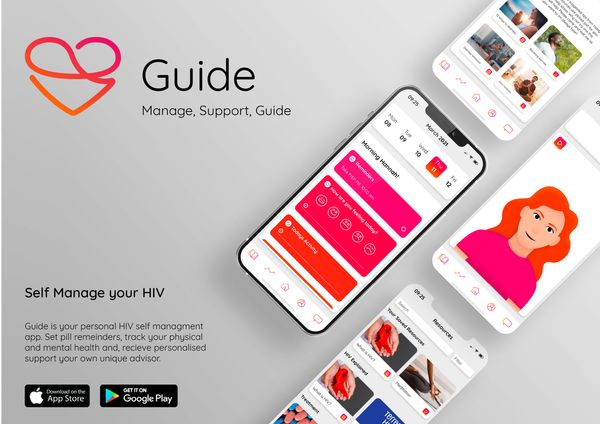
‘Guide’ is a mobile app using Artificial Intelligence (AI) to support people living with HIV self-managing their health and wellbeing. When first logging in, users can personalise their own AI health advisor who can answer questions and provide suggested resources to help with health management.
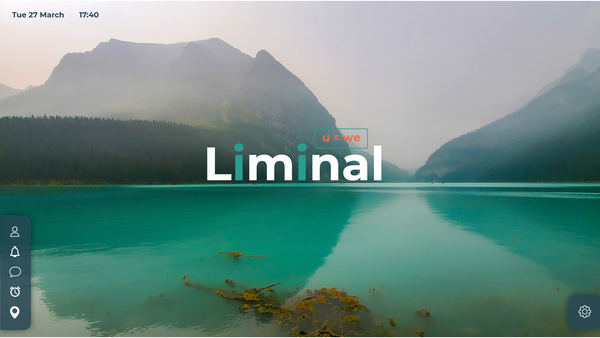
‘Liminal’ is a virtual reality platform designed to support people newly diagnosed with HIV or anyone going through a cycle of acceptance. The platform provides users with a transitional space to help them on their journey of acceptance.
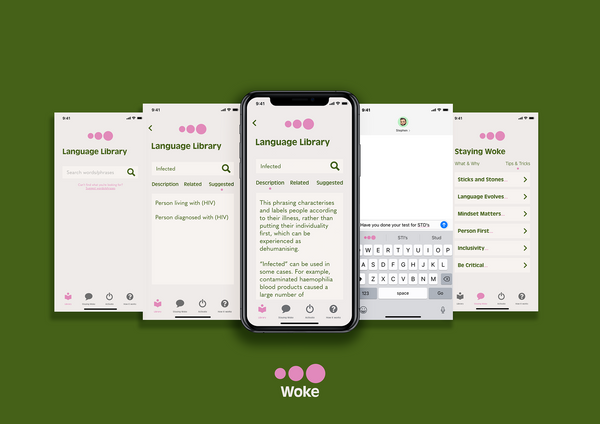
The ‘Woke’ app is a 3rd party auto-correct mobile application. It suggests language that is more inclusive when non-inclusive language is written. Typed words that are flagged as non-inclusive are underlined with a pink dotted line.
Three researchers in the INTUIT project team co-wrote a blog post for Terrence Higgins Trust, a leading HIV charitable organisation in the UK, with profile and reach. This work was coordinated with the Trust's Media and Communication team and was published on 14th July 2021. Link to publication
From 2019 to 2022 we have ran a workshop on inclusive privacy and security at the Symposium on Usable Privacy and Security (SOUPS). 2019 was the first year we explored inclusivity in a broader sense than universal design and inclusion of people with disabilities. This year we led with understanding the needs of a more diverse user population who may have more specific needs for privacy, such as people living with conditions like HIV. During this workshops, we used scenarios created by the team to explore how to manage privacy and security when generating health data which was to be purposefully shared with a limited audience. This introduced the idea of personas and scenarios to explore requirements to the cybersecurity community.
An invited presentation about the INTUIT research programme (entitled 'On Ethically Responsible Technology Innovation in Digital Healthcare') was given at the Department of Health and Social Care in June 2019, as part of the Science Seminar series. INTUIT researchers presenting were Durrant (Newcastle University, NU), Luger, (University of Edinburgh, UoE), and Bussone, (City).
Using INTUIT as a case study, the talk focused on the challenges posed by intelligent (AI) data-driven systems, and how we might design more ethical systems and interactions. We presented early insights from INTUIT studies, of sharing personal data with the HIV peer community to support the self-management of HIV. The talk also highlighted an analysis of current ethical frameworks, prompting a seminar discussion about how systems for sharing personal health data should ensure effective informing, and could support users in making voluntary choices about how and when they share information, and in reviewing and withdrawing the data.
Luger (UoE) contributed to the WEF report ‘Redesigning Data Privacy: Reimagining Notice and Consent for human technology interaction’, highlighting the importance of INTUIT as it tries to understand how consent might work within the content of collective interest. INTUIT was used as a grounded example of work in progress addressing these issues. The report is available to view at this link. The contribution to WEF policy initiatives is continuing through active contribution to the WEF taskforce ‘Data Intermediaries: Trusted Digital Agency’. This work will run over six months, commencing in January 2021, and will result in a collaborative WEF policy output.
The NU team and peer researcher at THT collaborated with the Children’s HIV Association (CHIVA) and its Youth Committee (CYC) to explore young people self-management of HIV in relation to their wellbeing. Young people with perinatally acquired HIV are a unique cohort due to the route of transmission. Insights from a workshop and diary study were presented at the CHIVA Annual Conference (2020). This early impact provided distinctly different perspectives on the INTUIT research subject matter, to those previously articulated by adult participants in INTUIT studies. This activity opened up new research directions whilst informing the INTUIT project about psychosocial dimensions of HIV self-management and self-care, particularly when transitioning to adult care.
[This engagement resulted in two follow up grant proposals co-developed between NU and CHIVA: EPSRC Digital Economy Telling Tales of Engagement and NIHR ARC Open Funding Competition.]
The NU team and peer researcher at THT was invited to join the Design Informatics webinar series on 29th April 2020. In our talk we described our collaborative and co-creative research practice within the INTUIT programme, focusing on the use of visual poetic inquiry to encourage dialogue and sense making of research data. Design Informatics is a research centre at Edinburgh University that designs systems for better human data interaction, in diverse settings such as health, culture, mobility and finance. Researchers at the centre explore how the design of flows of data sustain and enhance human values, through the use of new and emerging technologies and services such as the Internet of Things (IoT), Blockchain, Robotics, Speech Recognition and Data Visualisation. The video of our take can be accessed here.
INTUIT team members attended a Bristol Fast Track cities event run by Brigstowe HIV charity on 22 October, 2019, with the aim to raise the visibility and profile of the project and foster new stakeholder links for potential future participation in the work and potential future collaborations. This event was a community consultation on Bristol's approach to HIV prevention and treatment.
Insert some text to summarise the publications.
Understanding the attitudes and experiences of people living with potentially stigmatised long-term health conditions with respect to collecting and sharing health and lifestyle data, Digital Health.
Brown R, Sillence E, Coventry L, Simpson E, Tariq S, Gibbs J, Durrant A. (In Press)
Link to publicationCollecting and sharing self-generated health and lifestyle data: understanding barriers for people living with long-term health conditions–a survey study.
Brown R, Coventry L, Sillence E, Blythe J, Stumpf S, Bird J. Durrant A. (2022). Digital Health, 8, 8, 20552076221084458.
Link to publicationTrust, Identity, Privacy, and Security Considerations for Designing a Peer Data Sharing Platform Between People Living With HIV.
A Bussone, B Kasadha, S Stumpf, AC Durrant, S Tariq, J Gibbs, KC Lloyd, J Bird (2020) In Proceedings of the ACM on Human-Computer Interaction 4 (CSCW2), 1-27.
Link to publicationInvestigating Daily Practices of Self-care to Inform the Design of Supportive Health Technologies for Living and Ageing Well with HIV.
Claisse C, Kasadha B, Stumpf S, Durrant A. (2022) ACM CHI Conference on Human Factors in Computing Systems (’22).
Link to publicationCo-Creative Visual Poetic Inquiry for communicating lived experience of HIV self-management and self-care.
Claisse C, Kasadha B, Durrant A.C. (2021). Design for Health, 5 (2), 252-272.
Link to publicationCo-creating poetry for communicating individuals’ emotional experience of living with HIV
C Claisse, K Kasadha, A Durrant (2020) Proceedings of the 6th International Conference on Design4Health 1, 3.
Link to publicationPatient-generated data in the management of HIV: a scoping review.
Hewitt C, Lloyd K C, Tariq S, Durrant A, Claisse C, Kasadha B, Gibbs J. (2021). BMJ Open, 11 (5), pp. E046393.
Link to publicationPatient-generated data in the management of HIV: a review.
Hewitt C, Lloyd K, Tariq S, Durrant a, Claisse C, Kasadha B, Gibbs J (2020) HIV MEDICINE 21, 69-69.
Understanding Self-care practices to live well with HIV: A phenomenological study to inform supportive technology.
Sidat, S., Claisse, C., Laycock, D., Kasadha, B., Coventry, L. and Durrant, A., 2022. In AIDS 2022 The 24th International AIDS Conference.
Link to publicationUnderstanding the Barriers and Facilitators to Sharing Patient-Generated Health Data Using Digital Technology for People Living with Long-Term Health Conditions: A Narrative Review, Frontiers in Public Health 9.
Simpson E, Brown R, Sillence E, Coventry L, Lloyd K, Gibbs J, Tariq S, Durrant A C (2021)
Exploring the data-sharing ecosystem in HIV care: healthcare professionals’ beliefs and practices.
Lloyd K, Tariq S, Durrant A, Claisse C, Coventry L, Kasadha B, Sillence E... Gibbs J. (2021). P208
Link to publication